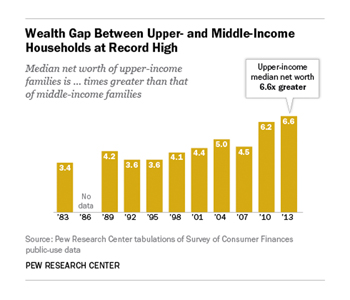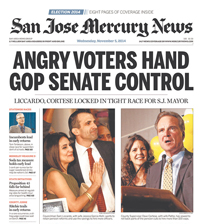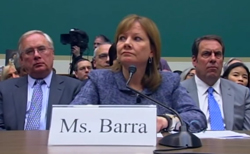Income disparity was one of the engines driving the protests that were ignited by the deaths of Michael Brown and Eric Garner at the hands of police. Whether police were at fault or not in the specific incidents, they focused rage at perceived discriminatory treatment.
New York policemen Wenjian Liu and Rafael Ramos lost their lives to the rage Dec. 20 when crazed Ismaaiyl Brinsley, who vowed on Instagram "I'm putting wings on pigs," shot them in their patrol car. He committed suicide.
 Annual income for the average American family is at the 1960s level. Black and minority families have fared far worse. A Pew study Dec. 17 found the "wealth gap" between the top 20% and the rest is at its biggest in 30 years. Net worth of top 20% climbed 101% to $639,400 in that period while net worth of those of middle income rose 2.3% to $96,500.
Annual income for the average American family is at the 1960s level. Black and minority families have fared far worse. A Pew study Dec. 17 found the "wealth gap" between the top 20% and the rest is at its biggest in 30 years. Net worth of top 20% climbed 101% to $639,400 in that period while net worth of those of middle income rose 2.3% to $96,500.
PR and promotions had to play against this backdrop as well as unsettling international news including the summer of carnage in Gaza/Israel, the slaughter of at least 148 including 132 children in Pakistan, the continuing face-off of Russia and the Ukraine, and other hot spots. New York Times struggled to report fairly on Gaza/Israel while bombarded by critics on both sides.
Distressing news included the crashes of two Malaysia Airlines flights within five months, the first taking 239 lives over the Indian Ocean in March and the second 295 lives after being shot down July 17 over Ukraine.
Revelations of torture of prisoners by the CIA late in the year were an embarrassment to government officials involved and shook the belief among Americans that we are somehow better than barbaric foreign countries. Some government officials supported torture and a Pew study found a majority of Americans agree with them.
The beheading of journalists by ISIS caused revulsion in the U.S. But 32 states still conduct executions which critics say is not only barbaric but insanely costly. California spent $4 billion on 13 executions since 1978 or $308 million per death. Life in prison is not only humane and four times as inexpensive, but can be economically productive. Lawyers make billions in the appeal process which averages 14 years per execution.
 The GOP’s victory in November, adding the Senate to the GOP column and in many state offices, was a seismic shift towards a conservative philosophy. Candidates who identified themselves with "family values" won in almost every instance. Almost no media acknowledged this although there was rejoicing in conservative and religious organizations such as the Family Research Council.
The GOP’s victory in November, adding the Senate to the GOP column and in many state offices, was a seismic shift towards a conservative philosophy. Candidates who identified themselves with "family values" won in almost every instance. Almost no media acknowledged this although there was rejoicing in conservative and religious organizations such as the Family Research Council.
Traditional media continued to take a pasting with the New York Times demanding that 100 reporters take retirement or face being fired. Some of its most experienced writers such as Floyd Norris and Stuart Elliott took packages that gave them more than two years’ pay.
NYT said it will decide in the New Year whether to name another ad columnist. Elliott mostly wrote about ad campaigns and covered PR about once a year. He tried to help 2011 PR Society chair Rosanna Fiske define "PR" and described a new name and ad campaign for FleishmanHillard.
What NYT needs is a "communications" column that will cover ad/PR equally and in depth. PR people have a profound influence on the flow of information and access to newsmakers.
The New Republic almost self-destructed as writers rebelled against policies of new owners.
On the PR side, Bulldog Reporter stopped barking after a run of 35 years. It filed for bankruptcy showing debt of nearly $900K. Headstones in the graveyard of PR media include PR Reporter, PR Quarterly, Reputation Management Mag, and the print versions of The Holmes Report and Ragan Report. Advertising Age went to bi-weekly after more than 80 years as a weekly. New York mag cut to 29 issues from 42. PR Week in the U.S. and U.K. are monthly mags.
Ninety-nine mag titles went belly-up in 2014 vs. 56 closures in 2013, according to Oxbridge Communications. Casualties included USA Weekend, Macworld and WWE Magazine. The Oxbridge MediaFinder.com also found that 190 mags debuted in 2014, up from 185 in 2013.
It’s no secret where much of the ad money is going. Google’s AdWords rake in $50 billion and significant ad income is now being registered by Facebook, Twitter and LinkedIn.
U.S. newspaper ad revenues plunged to the $20 billion mark from $47 billion in 2007. Few in recent generations read newspapers. Marketers judge papers by how much of a particular product a newspaper’s readers buy. Local media suffer because residents anywhere can easily read not only the New York Times, Washington Post, Wall Street Journal, and Huffington Post but overseas media such as The Independent, The Telegraph, The Guardian, Al Jazeera, RT (Russia Today), Press TV (Iran), and access services such as EIN News which monitors online news worldwide.
Sony Corp. generated a media firestorm when hackers allegedly aligned with North Korea broke into its communications system and outed emails, contracts and other documents. Sony attacked media using such info, saying they would be "responsible" for any damage arising from use of the documents.
 GM chief Mary Barra testifies before Congress. |
The General Motors "faulty switch" scandal broke early in the year and keeps getting "new legs" by revelations of failure to heed early warnings of problems with the switches. Sixty million cars were recalled by all companies in 2014, double the previous record of 30.8M set in 2004.
A bright spot for us was attending a journalism panel at CUNY hosted by the Investigative Reporters Assn. that featured New York Times reporters Dave Barstow and Walt Bogdanich. They told fledging journalists to get to sources before they are "shut down" by lawyers and to "go over the heads" of PR people who stonewall. Ploys include calling subjects and saying you have information for them rather than questions and pretending not to know much about a subject. Play "the country bumpkin" and "don’t be afraid to be a fool or look like an idiot," advised Bogdanich.
We were glad to hear that "going over the heads of PR people" who stonewall was described as basic journalism. The PR Society used a full page in its Tactics tabloid to accuse us of an ethical violation because we contacted the president of the University of Nebraska in 2011 after Prof. Gail Baker, then chair of the Society’s Ethics Board, refused to answer phone calls and e-mails. She quit the EB within four hours. The Society said we had no right to go to the boss of Baker.
 Murray |
PRSA was rocked in March by the sudden resignation of Bill Murray as CEO even though his contract extended to the end of the year. He gave no reason except that he made the decision after "deep reflection." The belated Society income tax return revealed he got a $63,058 bonus in 2013 after getting a $61,000 bonus in 2012. The Assembly did not get to see either document. Total pay in 2013 was $430,973. He went the National Coffee Assn. as CEO, an organization with a staff of nine (vs. nearly 60 at the Society).
The Society continued its boycott against the O’Dwyer Co., refusing to rent exhibit space to the company for its 2014 national conference in D.C. and refusing to allow any O’Dwyer reporter to join although hundreds of writers and journalists are members including PR and J profs who do plenty of writing and reporting. PR practitioners/journalists such as Fraser Seitel, author and PR counselor, and Gil Schwartz, PR head of CBS and Fortune columnist, have been members in the past.
Informed of the Society boycott, the Washington Marriott Wardman Park Hotel, where the 2014 conference was held, set aside a table in the bar for four days so the O’Dwyer Co. could display its six products. However, fewer than ten of the 3,000 attendees visited us. One of them was a student (among 1,000 at the conference) to whom we gave samples of the products. There’s no doubt a hex was put on us. Society leaders and staff sat across from us much of the time, watching who might come.
PR Society stonewalling infected the 6,483-student body Elon University of N.C. including its president, J and PR profs, the PR dept., and the student newspaper who all took a pass when PR Student Society president Heather Harder obeyed orders from national PRS not to deal with the O’Dwyer Co., forfeiting her rights of free speech and free inquiry. Another casualty is NBC newscaster Brian Williams, whose son Douglas went to Elon and who is spearheading a $15 million fund drive. Williams should not be within ten parsecs of a press boycott.
Politico, the hotshot D.C. website/magazine, came to New York by acquiring Capital New York and opening an office on West 39th st. with 42 staffers covering politics and media and promising "hard-hitting journalism." We hope so. Some of the content is free but "premium" service can be $3,000 or more depending on size of the user company. Susan Glasser replaced founders Jim VandeHei and John Harris as the top editor in D.C.
A shocker was the revelation that the 2014 cast of the "Financial Follies" of the New York Financial Writers Assn. included seven professional actors and actresses as well as seven NYFWA members. Only members ever appeared on stage until the past few years.
NYFWA once had nearly 20 members from NYT, many taking part in the show, as well as writers from other major financial media. The show was a way for PR people, who made up almost half the cast, to get to know the writers. About 90 or nearly one-third of members are now freelance. The evening remains a media/PR highlight of the fall with about 1,100 in happy attendance. For some reason, mainstream financial writers no longer want to be in the show.


 There’s a fine line between newsjacking and taking advantage, aka ambulance chasing. Our job as PR professionals is to tread it carefully.
There’s a fine line between newsjacking and taking advantage, aka ambulance chasing. Our job as PR professionals is to tread it carefully. PR firms need to be mindful of ways their work product may be protected by the attorney-client privilege whenever working with a client’s internal legal team or its external legal counsel.
PR firms need to be mindful of ways their work product may be protected by the attorney-client privilege whenever working with a client’s internal legal team or its external legal counsel. Manuel Rocha, former US ambassador and intenational business advisor to LLYC, plans to plead guilty to charges that he was a secret agent for Cuba.
Manuel Rocha, former US ambassador and intenational business advisor to LLYC, plans to plead guilty to charges that he was a secret agent for Cuba. CEO mentoring is an often-overlooked aspect of why CEOs are able to make good decisions, and sometimes make bad ones—all of which intersects with the role and duties of a board.
CEO mentoring is an often-overlooked aspect of why CEOs are able to make good decisions, and sometimes make bad ones—all of which intersects with the role and duties of a board.  How organizations can anticipate, prepare and respond to crises in an increasingly complex world where a convergent landscape of global challenges, threats and risks seem to arrive at an unrelenting pace.
How organizations can anticipate, prepare and respond to crises in an increasingly complex world where a convergent landscape of global challenges, threats and risks seem to arrive at an unrelenting pace.


 Have a comment? Send it to
Have a comment? Send it to 
No comments have been submitted for this story yet.